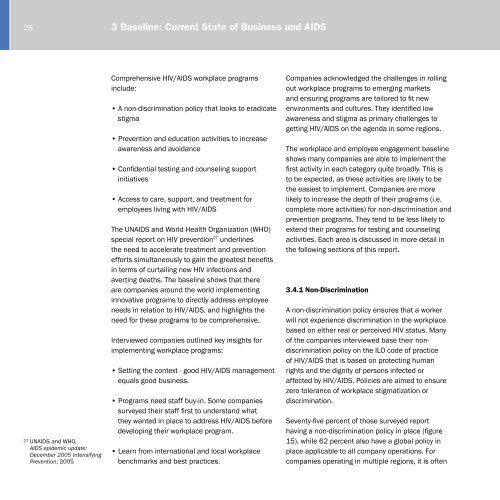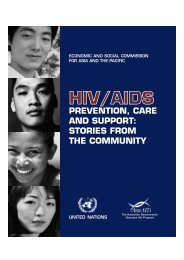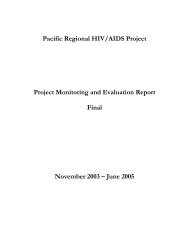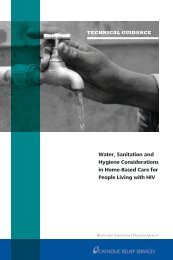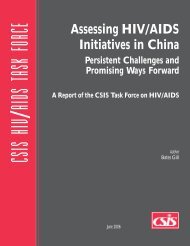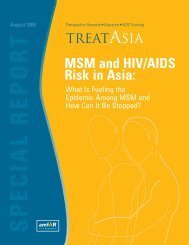The State of Business and HIV/AIDS (2006) - Booz Allen Hamilton
The State of Business and HIV/AIDS (2006) - Booz Allen Hamilton
The State of Business and HIV/AIDS (2006) - Booz Allen Hamilton
You also want an ePaper? Increase the reach of your titles
YUMPU automatically turns print PDFs into web optimized ePapers that Google loves.
26<br />
3 Baseline: Current <strong>State</strong> <strong>of</strong> <strong>Business</strong> <strong>and</strong> <strong>AIDS</strong><br />
27 UN<strong>AIDS</strong> <strong>and</strong> WHO,<br />
<strong>AIDS</strong> epidemic update:<br />
December 2005 Intensifying<br />
Prevention, 2005<br />
Comprehensive <strong>HIV</strong>/<strong>AIDS</strong> workplace programs<br />
include:<br />
• A non-discrimination policy that looks to eradicate<br />
stigma<br />
• Prevention <strong>and</strong> education activities to increase<br />
awareness <strong>and</strong> avoidance<br />
• Confidential testing <strong>and</strong> counseling support<br />
initiatives<br />
• Access to care, support, <strong>and</strong> treatment for<br />
employees living with <strong>HIV</strong>/<strong>AIDS</strong><br />
<strong>The</strong> UN<strong>AIDS</strong> <strong>and</strong> World Health Organization (WHO)<br />
special report on <strong>HIV</strong> prevention 27 underlines<br />
the need to accelerate treatment <strong>and</strong> prevention<br />
efforts simultaneously to gain the greatest benefits<br />
in terms <strong>of</strong> curtailing new <strong>HIV</strong> infections <strong>and</strong><br />
averting deaths. <strong>The</strong> baseline shows that there<br />
are companies around the world implementing<br />
innovative programs to directly address employee<br />
needs in relation to <strong>HIV</strong>/<strong>AIDS</strong>, <strong>and</strong> highlights the<br />
need for these programs to be comprehensive.<br />
Interviewed companies outlined key insights for<br />
implementing workplace programs:<br />
• Setting the context - good <strong>HIV</strong>/<strong>AIDS</strong> management<br />
equals good business.<br />
• Programs need staff buy-in. Some companies<br />
surveyed their staff first to underst<strong>and</strong> what<br />
they wanted in place to address <strong>HIV</strong>/<strong>AIDS</strong> before<br />
developing their workplace program.<br />
• Learn from international <strong>and</strong> local workplace<br />
benchmarks <strong>and</strong> best practices.<br />
Companies acknowledged the challenges in rolling<br />
out workplace programs to emerging markets<br />
<strong>and</strong> ensuring programs are tailored to fit new<br />
environments <strong>and</strong> cultures. <strong>The</strong>y identified low<br />
awareness <strong>and</strong> stigma as primary challenges to<br />
getting <strong>HIV</strong>/<strong>AIDS</strong> on the agenda in some regions.<br />
<strong>The</strong> workplace <strong>and</strong> employee engagement baseline<br />
shows many companies are able to implement the<br />
first activity in each category quite broadly. This is<br />
to be expected, as these activities are likely to be<br />
the easiest to implement. Companies are more<br />
likely to increase the depth <strong>of</strong> their programs (i.e.<br />
complete more activities) for non-discrimination <strong>and</strong><br />
prevention programs. <strong>The</strong>y tend to be less likely to<br />
extend their programs for testing <strong>and</strong> counseling<br />
activities. Each area is discussed in more detail in<br />
the following sections <strong>of</strong> this report.<br />
3.4.1 Non-Discrimination<br />
A non-discrimination policy ensures that a worker<br />
will not experience discrimination in the workplace<br />
based on either real or perceived <strong>HIV</strong> status. Many<br />
<strong>of</strong> the companies interviewed base their nondiscrimination<br />
policy on the ILO code <strong>of</strong> practice<br />
<strong>of</strong> <strong>HIV</strong>/<strong>AIDS</strong> that is based on protecting human<br />
rights <strong>and</strong> the dignity <strong>of</strong> persons infected or<br />
affected by <strong>HIV</strong>/<strong>AIDS</strong>. Policies are aimed to ensure<br />
zero tolerance <strong>of</strong> workplace stigmatization or<br />
discrimination.<br />
Seventy-five percent <strong>of</strong> those surveyed report<br />
having a non-discrimination policy in place (figure<br />
15), while 62 percent also have a global policy in<br />
place applicable to all company operations. For<br />
companies operating in multiple regions, it is <strong>of</strong>ten


